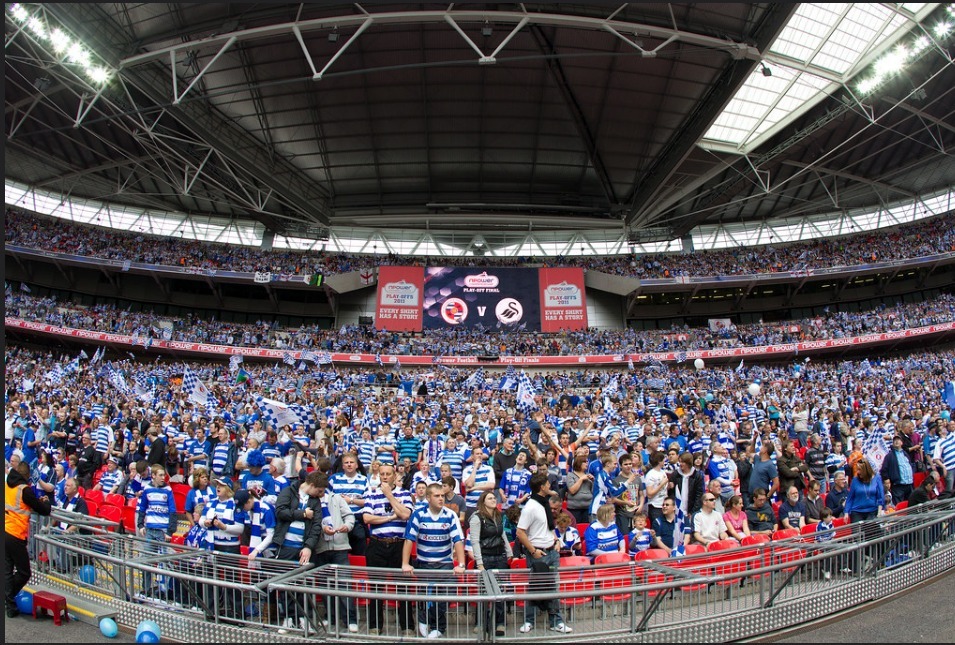Live fast, Dai Yongge: The sad tale of Reading FC’s drawn-out demise
A roiling sea of blues and whites slowed. The way the tide would next turn hinged upon the spot kick of Huddersfield Town’s steadfast German centre-back. The tenth of the shootout. Schindler’s twist.
With a crash, the murmuring froth billowed into a fearsome swell, tearing across Wembley’s cavernous interior. White and blue elation; blue and white damnation. Ali Al-Habsi in Reading net had guessed the right way, but still couldn’t keep out the £170 million-winning penalty. It wasn’t supposed to go like this; footballing improv had prevailed over scripted drama. Against all odds, on 29 May 2017 and at Reading’s expense, the Terriers (quite literal underdogs) had made it, via the play-offs, to the promised land of milk, honey, and José Mourinho.
Fast forward to the start of 2024 and both teams sit in 21st – Huddersfield in the Championship; Reading in League One, teetering on the precipice, overlooking the perilous plunge to the depths of League Two below.
The battles Reading are currently facing are not just confined to each weekend’s 90 minutes of action
In the last six years since their tale of Wembley woe, Reading have notched Championship finishes of 20th, 20th, 14th, 7th (the teases), 21st, and 22nd – last season’s position seeing their excommunication from the EFL’s leading competition. It’s been a desperately sad decline for a club who have placed as high as 8th in the Premier League this century (although not unique: see Portsmouth, Wigan, et al.).
Yet the battles Reading are currently facing are not just confined to each weekend’s 90 minutes of action – something itself not even always guaranteed. Against Port Vale on 13 January at Reading’s Madejski Stadium, just 16 minutes of play were managed before the game was called off with fans storming onto the pitch, desperately trying to jolt the ownership into action, to avert the club’s sleepwalk into inexistence.
Via their investment vehicle, Renhe Sports Management Co Ltd, Chinese siblings Dai Yongge and Dai Xiu Li’s accession to the Royals’ throne was finalised in May 2017, two weeks before the play-off final’s histrionics. Having failed the Premier League’s fit-and-proper owner test while attempting a takeover of Hull City the previous summer (presumably falling at the “Do you have petrostate funding?” question), the brother-and-sister duo tried, tried again elsewhere – their consortium this time succeeding to gain EFL approval.
A 75% stake in the club was confirmed. Promises of world class facilities and stadium expansion followed. Things were looking up.
Sadly, the only thing presently on the up in central Berkshire is the amount of carnage being caused under Yongge’s stewardship (Xiu Li’s presence is much less felt). Despite having reportedly spent north of £200 million on the club under his watch, very little has come of it; Reading’s financial statements would make even Todd Boehly’s accountant wince.
Chaos reigns. The EFL allows a pre-tax loss of £13 million per season. Reading have lost £146 million in the last five years. A transfer market embargo means the last time a fee was paid for a player was in 2020; the next is unlikely to come before 2025. Since 2021, the team has been docked 16 league points (including 6 handed down last season – without which Reading would have stayed up). Two winding-up petitions later over unpaid tax – issued and eventually withdrawn by HMRC – the club is punch-drunk yet somehow still conscious.
That there are thousands of fans who have felt before what Readingites are going through is a stain on the English club landscape
Yongge has been targeted by the EFL with personal fines too – this season the Chinese tycoon has been arraigned thrice over late and incomplete player payments – leading to the body laying down an ultimatum: sort it out, or sell. After an unsuccessful attempt to ban Yongge from all footballing activity for 12 months, it’s clear they’d prefer the latter. As would the fans. “Sell Before We Dai”, a supporter pressure group, have labelled the Yongge years as “an unmitigated disaster”. Port Vale was not the first protest, nor will it be the last.
That there are thousands of fans who have felt before what Readingites are going through is a stain on the English club landscape. Footballing malfeasance’s ugly tendrils extend far beyond a stadium’s concourse. In its most basic parts this is a game of communities, of memories which span across generations. It certainly doesn’t augur well that the last two clubs the Dais have enmeshed themselves in, Beijing Renhe, and KSV Roeselare, no longer exist. Here’s hoping to third time lucky.

Comments